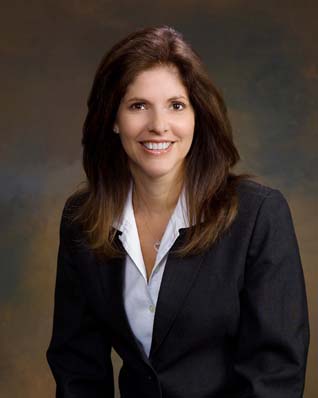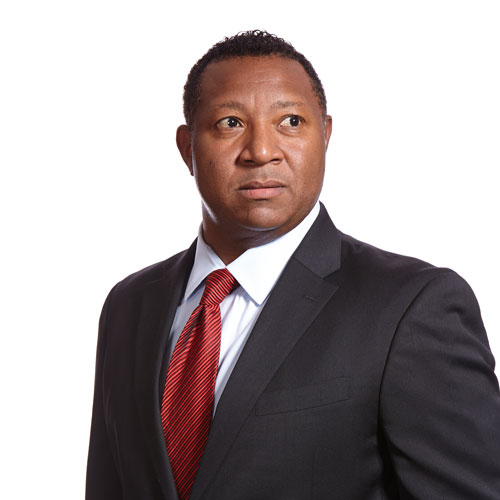
Whether sharing coffee with an up-and-coming executive or heads of state, Ana Wugofski believes in the power of personal connection. As vice president of business development for Lockheed Martin Aeronautics, she is growing international business for the company’s F-35 fighter jets, a task that requires the same social finesse she practices while mentoring and promoting diversity at the company. In each realm, she must listen, build trust, and demonstrate that she is an advocate before she can serve her own intentions or those of the business. She discusses how to do so in four initiatives.
1. Growing International Business
The term “quick sale” is not in Wugofski’s vocabulary. It’s rare that after a first encounter a customer will buy within three months. Rather, Wugofski has spent years—sometimes as many as eight—nurturing the relationships that grow Lockheed Martin’s international business.
Wugofski is selling more than just a powerful piece of machinery, especially in the international arena, where she may be facilitating a security relationship with the United States, comingled with the US government’s seal of approval, tied together by the reputation of a brand that is time-tested and superior. “It takes quite a lot of time sitting down with customers and truly understanding their needs,” says Wugofski, who prefers doing so over a cup of coffee rather than in a stuffy board room.
The “getting to know them” aspect isn’t just a euphemism for a file folder full of data points and cultural protocol. Relationships are built over years—often through trials more than tribulations. For international relationships this is even truer, as the customer must trust you understand their intent and won’t react to something lost in translation.
On a recent trip to visit a long-time client, a difficult issue came up. Wugofski phoned the client, a general, and said she didn’t feel comfortable moving forward without hearing his concerns. “We met and talked for an hour,” she says. “He was obviously emotional, but he felt comfortable expressing himself based on the mutual trust between us. As we shook hands and I left for the airport, he knew I would make every attempt to address his concerns.”
“It’s important for customers to understand our product and for us to understand their circumstances, needs, and concerns,” Wugofski adds. The circumstances that can affect Lockhead Martin’s business can be as simple as money and as complex as diplomatic relations. “We develop for the United States,” she says, “where we enjoy a high level of infrastructure, training, and knowledge for our products. Some countries don’t have the same resources, so we need to adapt our product to ensure we deliver the required capability.”
2. Supporting Clients With Accurate Information
The sensitivity of the conditions under which most clients purchase Lockheed Martin’s products invites opportunities for criticism and confusion. “These products serve a country’s national security interests, so it’s fairly serious,” says Wugofski, which is why her job doesn’t end just because the ink has dried on the check.
When a client begins a relationship with Lockheed Martin by purchasing its products, it incurs the responsibility of communicating that purchase and its necessity to the many people affected by it. In some cases, misinformation promoted by competitors or ideological opponents can make the job even harder, so Wugofski acts as a communications advocate to smooth any wrinkles that may interfere with implementation.
“Our customers often face criticism,” she says. “We’re the people they call in those times to ensure they have accurate information, but also to put it in context and make it applicable.”
Supporting her clients through their challenges serves the immediate purposes, but in the long term, Wugofski says the value is in the trust she builds with clients. “Our customers depend on us to tell them not just what they want to hear, but the bad news as well,” she says. “They could think we’re just spinning information if we don’t establish that trust and confidence.”
Up Close & Personal
with
Ana Wugofski
What language would you like to learn and why?
It would be Arabic. When I’m in those countries where it is spoken, I just wish I knew what people were really saying or what they meant. Sometimes translations lose that.
What is your favorite country to visit? Italy. I never got bored there and never stay in my hotel much. I was able to get my whole family there the last time I went—just before Thanksgiving. We rented a little apartment. I went to work all day while they saw the sights. Then after negotiations, I spent a few days just walking the streets, eating at restaurants, living the culture, and talking to people. What I’d do if I were at home.
What is your favorite art form? I’ve come to really appreciate ballet. Even though I don’t have the ballerina gene, I do have the Latin-dancing gene.
What is your favorite Latin American dish and where would you go to get it? Cuban food. My husband is the cook in the family, but when it comes to Cuban food, that’s me.
3. Promoting Diversity
One of the most powerful assets Wugofski brings to her international relations is empathy, and it doesn’t lose its value within the walls of Lockheed Martin. Critical to a successful workforce and one that thrives on the differences among its people, is the ability to appreciate diverse backgrounds and value diverse experiences. Encouraging this perspective can drive innovation on a company level, and can improve the lives of employees on the local level.
As a member of the company’s diversity council, Wugofski has seen both unfold. In one training workshop, she herself learned how something as simple as an introduction can help or hinder employee performance. Wugofski was given the scenario of making introductions at a professional function. If she led one introduction by speaking of an employee’s indispensability but opened the next with just the employee’s name and title, she could have unknowingly showed favoritism and unmotivated the other employee.
“[Diversity training] opens people’s eyes so they don’t prejudge others or a situation,” Wugofski says. “There’s usually something else behind people’s actions that you have to understand.” For example, an employee who avoids working late is perceived by coworkers as being less committed, until they realize she had experienced a violent attack and is fearful of walking in a poorly lit parking lot.
4. Mentoring
It’s been more than two decades since Wugofski did the work of an engineer, but insights are timeless, and she hopes to share hers with the next generation of Lockheed Martin’s executives. The way Wugofski puts her experience into context is by the same technique she uses with clients. “I learn a lot from them by listening and hearing about the conditions they’re working in and the challenges they’re facing,” she says. “I bring to mentoring what I bring to international business: trying to understand another person’s circumstances.”
Many of her Hispanic mentees are engineers, and while Wugofski says many of the attributes that make Lockheed Martin’s associates successful are not specific to one ethnicity or another, Hispanics show a common challenge of sharing time between work and family. One way Wugofski has found to ease the stress of that balancing act is by finding value in one’s work. “People aren’t always in the job they want to be in,” she says. “There will never be a perfect balance, but I think finding value in what you do will help you develop a passion for it.”

